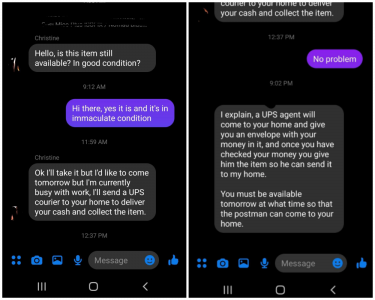Ever use Facebook marketplace? Don’t fall for scammers promising cash through couriers!
Aussies selling via platforms such as Facebook Marketplace must exercise caution – scammers could pose as potential buyers promising payment that will never arrive.
One user was close to falling for this new sneaky trick doing the rounds, but luckily sought other Aussies’ opinions first.
Through the social news website Reddit, they posted: ‘Is this message I received on Facebook Marketplace a scam attempt, or have I just become too suspicious of people?’
The post came with two photo attachments that showed how the conversation flowed between the seller and the scammer.

The scammer told the seller that a postman would deliver an envelope with cash. Credit: Reddit/hohsarahh
The scammer was very direct in the exchange of messages – after asking about the condition of the item, they immediately said they would take it. However, there was an issue: they’d like to meet in person but couldn’t because of work. Thankfully, UPS could deliver their payment and subsequently collect the product. The seller answered with a succinct ‘No problem.’
The buyer emphasised in another text that a UPS agent would come to the seller’s address with money in an envelope. They said the seller had to be home at their preferred time so the postman could meet them.
Luckily for the seller, their ‘spidey senses’ started tingling. They went to Reddit instead of responding to the fraudster with a time and an address.
Other Aussies promptly confirmed that it was a scam, and a common one at that, too.
One said: ‘This is 100% a scam.’ When asked about how it worked, they said: ‘There are a few possibilities. They’ll ask you for money or turn up to pick up without any or some other f**kery. It could also just be straight-up theft; the person who turns up will just take the item, particularly small electronic items.’
Another person responded: ‘They sometimes pay with a cheque, take the item, then the cheque will bounce. Or they'll deliberately overpay you via cheque or some other non-cash way, ask you to send them the amount they overpaid, and then the original funds will be taken back out of your account, so you're out the overpay.’
A third said: ‘They'll say UPS requires an insurance deposit, but they'll refund the money once they receive the package. Nobody ever comes to pick it up, and the money is obviously never refunded.’
Someone else who confirmed the scam pointed out something important: ‘No decent courier company is going to let their staff carry cash around to random houses on the off-chance it's you that the scammer is looking to roll someone for money. Their work cover insurance probably has a clause specifically prohibiting it.’
This is true. Most couriers around the globe do not ship cash. It’s meant to protect companies and customers from instances of theft which would be more likely if packages contained money.
UPS – which others confused for USPS, or the United States Postal Service, on the thread – also prohibits the shipment of bank bills, notes and other forms of currency save for cheques and collectible coins in all the countries they serve. Australia Post has a similar policy. According to their website, they do not deliver bullion, bank notes or coins in any international services even if the parcel’s destination does not prohibit them. Australia Post recommends sending money orders if you need to instead.
The author of the post ended up blocking and reporting the scammer.
Facebook Marketplace is rife with scams. According to thinkmoney.co.uk, 1 in 6 users around the globe have been scammed, while 9% had been approached by a fake profile. Even though it is a favourite for online tricksters, you can still use it successfully if you keep your wits about you. Here are some things you can do to avoid being swindled:
- If you suspect that a buyer or seller is a scammer, run their photo through a reverse image search. Fraudsters are more likely to steal a photo and pass it off as their own. You can use Tineye and Google Images.
- Insist on communicating within Facebook. It is harder to dispute a transaction outside of it.
- Decline the charge if a buyer overpays. Request payment with the correct amount instead.
- Do not click any links, especially if a buyer is asking you to pay an insurance fee. The links on emails you will receive are likely spoofed.
When dealing with people online, trust your gut. You can ask your friends (or us here at SDC!) and search online if something feels off or too good to be true.
Did you ever have any close calls with a scammer? We’d love to know your stories!





